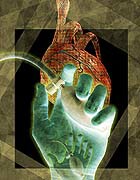
THURSDAY, Aug. 18 (HealthDay News) — An experimental heart failure drug may change the way doctors treat this vexing condition, researchers say.
Heart failure, also called congestive heart failure, occurs when the heart can no longer pump strongly enough for blood to the reach the rest of the body. About 5.7 million people in the United States have heart failure, and 300,000 people die from it each year, according to the U.S. National Heart, Lung, and Blood Institute. While no cure exists, treatments focus on improving quality of life and helping people live longer.
A new drug — omecamtiv mecarbil, which is being developed by Cytokinetics Inc. in San Francisco — may someday offer an alternative to current treatments, according to the results of two clinical trials published Aug. 20 in a special issue of The Lancet.
“It improves heart function in a completely new and unique manner,” said Dr. John R. Teerlink, a cardiologist at the San Francisco Veterans Affairs Medical Center and author of one of the new studies.
“The drug directly increases the activation of certain heart muscle proteins, effectively recruiting ‘more hands on the rope’ with each heartbeat,” he said. “By improving the efficiency and performance of the heart, it is our hope that patients with heart failure will actually feel better with fewer symptoms of fatigue and shortness of breath, and perhaps even live longer,” he said.
However, it is too early to draw any sweeping conclusions, as the drug — called a cardiac myosin activator — is in the early stages of clinical trials.
The currently available heart failure drugs, such as milrinone (Primacor) and dobutamine (Dobutrex), indirectly increase heart function, and can cause dangerous, even deadly, heart rhythm abnormalities, Teerlink said. “These drugs are ‘necessary evils’ because they are the only currently available pharmacologic means to increase heart function,” he said.
Teerlink’s study involved 34 healthy men who received the drug intravenously once a week for one month. It was designed to determine the optimal dosing regimen for the new drug.
The other study, conducted at the University of Hull in East Yorkshire, England, marks the first time that the agent was studied in people with heart failure. The researchers said omecamtiv mecarbil safely improved cardiac function in 45 people with heart failure who were already receiving standard treatment.
Dr. Ronald Zolty, director of the heart failure program at the Albert Einstein College of Medicine in New York City, is cautiously optimistic about the new heart failure drug.
“It is a promising drug, but we have been down this road before,” he said.
“When you have heart failure, the pumping action of the heart is weak, so not enough blood gets to the body, and you feel short of breath, sleep a lot and your kidneys don’t work,” Zolty explained.
Existing drugs do improve the “squeeze,” but they also increase mortality, he said.
Dr. Michele Hamilton, director of the heart failure program at Cedars-Sinai Heart Institute in Los Angeles, agreed with Zolty on the need for a new heart failure drug.
“The major problem we face in treating heart failure is how can we make the heart squeeze harder,” she said. To date, no medications have proven effective or safe, and as a result, doctors focus on getting rid of excess fluid buildup and reducing stress on the heart, she said.
Medications that make the heart squeeze harder put more stress on the heart, and the patients die sooner. “It is akin to whipping a tired horse as it goes uphill,” she said.
“It’s great to see a new medication being tested and developed,” Hamilton said. But, “we are far away from the finish line.”
More information
To learn more about heart failure, visit the U.S. National Heart, Lung, and Blood Institute.

